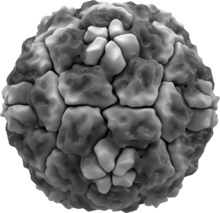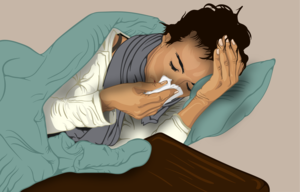Common cold/ja: Difference between revisions
Created page with "==診断{{Anchor|Diagnosis}}== ウイルス性上気道感染症の区別は、症状の部位に大まかに基づいており、感冒は主に鼻(鼻炎)、咽頭(咽頭炎)、肺(気管支炎)に影響を及ぼす。重複が多く、複数の部位が冒されることもある。自己診断は頻繁である。ウイルスの分離が行われることはまれで、症状からウイルスの種類を特定す..." Tags: Mobile edit Mobile web edit |
Created page with "==予後{{Anchor|Prognosis}}== 感冒は一般に軽症で自然に治り、ほとんどの症状は1週間で改善する。小児の場合、半数は10 日で、90%は15 日で治る。重篤な合併症が起こる場合は、通常、超高齢者、超幼児、または免疫抑制状態にある人である。二次的な細菌感染により、副鼻腔炎、咽頭炎、acute otitis media/ja|..." |
||
| (14 intermediate revisions by the same user not shown) | |||
| Line 67: | Line 67: | ||
ウイルス性[[upper respiratory tract infections/ja|上気道感染症]]の区別は、症状の部位に大まかに基づいており、感冒は主に鼻(鼻炎)、咽頭(咽頭炎)、肺(気管支炎)に影響を及ぼす。重複が多く、複数の部位が冒されることもある。自己診断は頻繁である。ウイルスの分離が行われることはまれで、症状からウイルスの種類を特定することは一般に不可能である。 | ウイルス性[[upper respiratory tract infections/ja|上気道感染症]]の区別は、症状の部位に大まかに基づいており、感冒は主に鼻(鼻炎)、咽頭(咽頭炎)、肺(気管支炎)に影響を及ぼす。重複が多く、複数の部位が冒されることもある。自己診断は頻繁である。ウイルスの分離が行われることはまれで、症状からウイルスの種類を特定することは一般に不可能である。 | ||
==予防{{Anchor|Prevention}}== | |||
==Prevention== | 風邪ウイルスの蔓延を抑える唯一の有効な方法は、[[correct hand washing technique/ja|正しい手洗い法]]やフェイスマスクの使用などの物理的および[[:en:Engineering controls|工学的]]対策であり、医療環境ではガウンや使い捨て手袋も使用される。飛沫予防策では、一般的な風邪を含んだエアロゾルの[[Airborne_transmission/ja#Prevention|吸入]]を確実に防ぐことはできない。その代わりに、[[Respirator/ja|呼吸器]]、[[Ventilation_(architecture)/ja|換気]]、[[HEPA/ja|HEPA]]/[[Minimum_efficiency_reporting_value/ja|高MERV]]フィルターなどの空気感染予防策が、おそらく寒冷を含むエアロゾルに対する唯一の信頼できる防護策である。隔離や[[quarantine/ja|検疫]]は、この病気が非常に広範囲に広がっており、症状が非特異的であるため用いられない。風邪を予防するワクチンはない。[[vaccination/ja|ワクチン]]接種は、関与するウイルスが多く、急速に[[Viral evolution/ja|変異]]するため、困難であることが判明している。そのため、広く有効なワクチンを作ることは非常に困難である。 | ||
定期的な手洗いは、特に小児の風邪ウイルスの感染を減らすのに効果的であるようだ。通常の手洗いに[[antiviral drug/ja|抗ウイルス剤]]や[[antibacterial/ja|抗菌薬]]を加えることでより大きな効果が得られるかどうかは不明である。感染者のそばにいるときにフェイスマスクを着用することは有益かもしれないが、より[[social distancing/ja|社会的距離]]を保つための十分な証拠はない。 | |||
[[Zinc/ja#Biological role|亜鉛]]サプリメントが風邪にかかる可能性に影響するかどうかは不明である。日常的な[[vitamin C/ja|ビタミンC]]サプリメントは、風邪の期間を短縮することはあっても、風邪のリスクや重症度を軽減することはない。 | |||
==管理{{Anchor|Management}}== | |||
==Management== | [[File:Pneumonia strikes like a man eating shark.jpg|upright|thumb|風邪の治療について「医師に相談する」よう市民に呼びかける1937年のポスター]] | ||
[[File:Pneumonia strikes like a man eating shark.jpg|upright|thumb| | |||
風邪の治療には、主に[[symptomatic treatment/ja|対症療法を目的とした薬物療法やその他の療法]]が用いられる。十分な休息、水分補給のための飲水、温塩水による[[gargling/ja|うがい]]は妥当な保存的手段である。しかし、対症療法による利益の多くは[[placebo effect/ja|プラセボ効果]]によるものである。2010年時点では、感染期間を短縮することが決定的に証明された薬や漢方薬はない。 | |||
===対症療法=== | |||
[[File:Treatments for the Common Cold (37652567755).jpg|thumb|風邪に対する様々な治療法 - 液体や錠剤の風邪薬、お茶、のど飴、市販の解熱剤など]] | |||
[[File:Treatments for the Common Cold (37652567755).jpg|thumb| | 症状を改善する可能性のある治療法には、単純な[[analgesics/ja|痛み止め]]や、[[ibuprofen/ja|イブプロフェン]]や[[Paracetamol/ja|アセトアミノフェン(パラセタモール)]]などの[[antipyretic/ja|発熱時の薬]]がある。しかし、アセトアミノフェンが症状を改善するかどうかは明らかではない。市販の[[cough medicine/ja|咳止め薬]]が[[Acute (medicine)/ja|急性]]の咳に有効かどうかは不明である。咳止め薬は、有効性を裏付ける証拠が乏しく、害を及ぼす可能性があるため、小児への使用は推奨されていない。2009年にカナダは、リスクと証明されていない利益に関する懸念から、6歳以下の小児に対する[[over-the-counter/ja|市販の]]咳止め薬と風邪薬の使用を制限した。[[dextromethorphan/ja|デキストロメトルファン]](市販の咳止め薬)の誤用により、多くの国で使用が禁止されている。[[Corticosteroid/ja|鼻腔内コルチコステロイド]]は有用性が認められていない。 | ||
成人では、[[nasal decongestants/ja|鼻腔充血除去薬]]の短期間の使用はわずかな有益性がある。[[Antihistamine/ja|抗ヒスタミン薬]]は最初の1~2日で症状を改善することがあるが、長期的な有益性はなく、眠気などの副作用がある。[[pseudoephedrine/ja|プソイドエフェドリン]]などの他の充血除去薬も成人には有効であるようである。経口鎮痛薬、抗ヒスタミン薬、充血除去薬の併用は、年長の小児および成人には一般に有効である。[[Ipratropium/ja|イプラトロピウム]]点鼻薬は、鼻水の症状を軽減することがあるが、鼻づまりにはほとんど効果がない。イプラトロピウムは、成人の咳にも効果がある。小児における鼻腔充血除去薬の使用の安全性と有効性は不明である。 | |||
研究が不足しているため、水分摂取の増加が症状を改善するか、呼吸器疾患を短縮するかはわかっていない。2017年現在、ライノサーム(RhinoTherm)を介したような加熱・加湿された空気の有益性は不明である。ある研究では、[[Chest rub/ja|胸部蒸気摩擦]]が夜間の咳、鼻づまり、睡眠障害をある程度緩和することが判明している。 | |||
発熱、広範囲の[[Myalgia/ja|筋肉痛]]、または[[fatigue (medical)/ja|疲労]]などの症状がある場合は、[[physical exercise/ja|身体運動]]を避けるように助言する人もいる。症状が[[runny nose/ja|鼻水]]、[[nasal congestion/ja|鼻づまり]]、[[sneezing/ja|くしゃみ]]、軽度の[[sore throat/ja|喉の痛み]]などの[[human head/ja|頭部]]に限定されている場合は、中程度の運動を行っても安全とみなされる。温かい飲み物を飲むと風邪の症状が和らぐという俗信があるが、それを裏付ける証拠は非常に限られている。 | |||
===抗生物質と抗ウイルス薬=== | |||
[[antibiotics/ja|抗生物質]]は風邪を含むウイルス感染には効果がない。その副作用のために、抗生物質は全体的な害をもたらすが、それでも頻繁に処方される。抗生物質が一般的に処方される理由には、抗生物質に対する人々の期待、助けたいという医師の願望、抗生物質が効くかもしれない合併症を除外することの難しさなどがある。風邪に有効な[[antiviral drug/ja|抗ウイルス薬]]はない。 | |||
[[ | |||
<div lang="en" dir="ltr" class="mw-content-ltr"> | <div lang="en" dir="ltr" class="mw-content-ltr"> | ||
| Line 131: | Line 111: | ||
</div> | </div> | ||
==予後{{Anchor|Prognosis}}== | |||
==Prognosis== | 感冒は一般に軽症で自然に治り、ほとんどの症状は1週間で改善する。小児の場合、半数は10 日で、90%は15 日で治る。重篤な合併症が起こる場合は、通常、超高齢者、超幼児、または[[immunosuppressed/ja|免疫抑制]]状態にある人である。二次的な細菌感染により、[[sinusitis/ja|副鼻腔炎]]、[[pharyngitis/ja|咽頭炎]]、[[acute otitis media/ja|耳感染症]]が起こることがある。副鼻腔炎は8%、耳感染症は30%に起こると推定されている。 | ||
==疫学{{Anchor|Epidemiology}}== | |||
==Epidemiology== | 風邪は最も一般的な人間の病気であり、世界中の人々が罹患している。通常、成人は年間2~3回感染し、小児は年間6~10回(学童は年間12回)感染する。高齢者では免疫力の低下により、有症状の感染率が増加する。 | ||
===天候=== | |||
=== | よくある誤解は、寒さに長時間さらされるだけで「風邪をひく」というものである。現在では、風邪はウイルス感染症であることが知られているが、そのようなウイルスの多くは季節性であり、寒い時期に多く発生する。この季節性の理由はまだはっきりとは解明されていない。考えられる説明としては、寒さによる呼吸器系の変化、免疫反応の低下、低湿度によるウイルス感染率の上昇などがあり、おそらく空気が乾燥しているため、小さなウイルス飛沫が遠くまで飛散し、空気中に長く留まることが原因であろう。 | ||
明らかな季節性はまた、人々が屋内で過ごす時間が長くなる、感染者の近くにいる、特に学校に通う子供など、社会的要因によるものかもしれない。通常の寒さへの暴露では感染リスクは高まらないが、体温を著しく低下させるような重度の暴露([[hypothermia/ja|低体温症]])は、風邪のリスクを高める可能性がある。 | |||
==歴史{{Anchor|History}}== | |||
==History== | [[File:The Cost Of The Common Cold & Influenza.jpg|upright|thumb|[[:en:World War II|第二次世界大戦]]中のイギリスのポスター]] | ||
[[File:The Cost Of The Common Cold & Influenza.jpg|upright|thumb| | |||
風邪の原因が特定されたのは1950年代のことだが、この病気は人類の歴史の初期から存在していたようだ。その症状と治療法は、紀元前16世紀以前に書かれた現存する最古の医学書であるエジプトの[[:en:Ebers papyrus|エベルス・パピルス]]に記述されている。"風邪"という名称は、その症状が寒冷な気候にさらされたときの症状に似ていることから、16世紀に使われるようになった。 | |||
イギリスでは、1946年に[[:en:Medical Research Council (UK)|医学研究評議会]]によって[[:en:Common Cold Unit|感冒ユニット(CCU)]]が設立され、1956年にライノウイルスが発見された。1970年代、CCUはライノウイルス感染症の潜伏期に[[interferon/ja|インターフェロン]]を投与することで、ライノウイルス感染症からある程度保護されることを実証したが、実用的な治療法は開発されなかった。ライノウイルス風邪の予防と治療における[[Zinc gluconate/ja#Zinc gluconate and the common cold|グルコン酸亜鉛トローチ]]の研究が完了した2年後の1989年に、このユニットは閉鎖された。 | |||
==研究の方向性{{Anchor|Research directions}}== | |||
==Research directions== | [[Antiviral drug/ja|抗ウイルス剤]]は感冒に対する有効性が試験されているが、2009年現在、有効性が確認され、使用が認可されたものはない。[[picornavirus/ja|ピコルナウイルス]]esに対して有望な抗ウイルス薬[[pleconaril/ja|プレコナリル]]の臨床試験とBTA-798の臨床試験がある。プレコナリルの経口剤には安全性の問題があり、エアゾール剤が研究されている。既知のすべてのヒトライノウイルス株の[[genome/ja|ゲノム]]が解読されている。 | ||
[[Antiviral drug| | |||
==社会的影響{{Anchor|Societal impact}}== | ==社会的影響{{Anchor|Societal impact}}== | ||
Latest revision as of 22:34, 18 April 2024
| 風邪 | |
|---|---|
| Other names | Cold, acute viral nasopharyngitis, nasopharyngitis, viral rhinitis, rhinopharyngitis, acute coryza, head cold, upper respiratory tract infection (URTI) |
 | |
| ヒトライノウイルスの1つの変種の分子表面を表したものである | |
| Specialty | 感染症 |
| Symptoms | Cough/ja, sore throat/ja, みずっぱな, fever/ja |
| Complications | 通常は何も起こらないが、時に中耳炎、副鼻腔炎、肺炎、敗血症が起こることがある。 |
| Usual onset | 感染からの日数~2 days |
| Duration | 1–3 週 |
| Causes | ウィルス (通常ライノウィルス) |
| Diagnostic method | Based on symptoms |
| Differential diagnosis | Allergic rhinitis/ja, bronchitis/ja, bronchiolitis/ja, pertussis/ja, sinusitis/ja |
| Prevention | Hand washing/ja, 咳エチケット, social distancing/ja, vitamin C/ja |
| Treatment | 対症療法, zinc/ja |
| Medication | NSAIDs/ja |
| Frequency | 2–3 per year (adults) 6–8 per year (children) |
風邪または感冒とは、上気道のウィルス感染症の一種であり、主に鼻、喉、副鼻腔、喉頭の呼吸器上皮を侵す。ウイルスに暴露してから2日未満で徴候や症状が現れることがある。これらには咳、喉の痛み、鼻漏、くしゃみ、頭痛、発熱が含まれる。通常7~10日で回復するが、症状によっては3週間続くこともある。時折、他の健康問題を持つ人が肺炎を発症することがある。
200を超えるウイルス株が風邪の原因に関与しており、ライノウイルス、コロナウイルス、アデノウイルス、エンテロウイルスが最も一般的である。エンテロウイルスは、感染者との密接な接触の際に空気感染するか、環境中の物との接触によって間接的に感染し、その後口や鼻に感染する。危険因子としては、保育施設への出入り、|よく眠れない、心理的ストレスなどが挙げられる。症状のほとんどは、ウイルス自身による組織破壊ではなく、感染に対する身体の免疫反応によるものである。インフルエンザの症状は風邪の症状と似ているが、通常はより重く、鼻水を含むことは少ない。
風邪に対するワクチンはない。主な予防法は、手洗い、洗っていない手で目、鼻、口を触らないこと、病人から離れることである。フェイスマスクの使用を支持する証拠もある。また、治療法はないが、症状を治療することはできる。亜鉛は症状発現後すぐに開始すれば、症状の期間と重症度を軽減する可能性がある。イブプロフェンなどの非ステロイド性抗炎症薬(NSAIDs)は疼痛に効果がある。しかし、すべての風邪はウイルスが原因であり、咳止め薬が有効であるという十分な証拠はないため、抗生物質は使用すべきではない。
風邪は人間に最も頻繁に起こる感染症である。通常の状況では、平均的な大人は年に2~3回、平均的な子供は6~8回風邪をひく。感染症は冬の間に多く発生する。これらの感染症は人類の歴史を通じて存在してきた。
徴候と症状

風邪の典型的な症状には、咳、鼻水、くしゃみ、鼻づまり、喉の痛みがあり、時に筋肉痛、疲労、頭痛、食欲不振を伴う。のどの痛みは約40%、咳は約50%、筋肉痛も同様に約50%にみられる。成人では一般に発熱はないが、乳幼児ではよくみられる。咳は通常、インフルエンザに伴うものに比べて軽い。成人の場合、咳と発熱はインフルエンザの可能性が高いことを示しているが、これら2つの症状には多くの類似性が存在する。風邪を引き起こすウイルスの多くは、無症状感染を引き起こすこともある。
粘液や鼻汁の色は、透明、黄色、緑色などさまざまで、感染を引き起こしている病原体の種類を示すものではない。
経過

。
風邪は通常、疲労感、寒気、くしゃみ、頭痛で始まり、2、3日後に鼻水と咳が続く。症状は風邪をひいてから16時間以内に始まり、通常、発症から2~4日後にピークに達する。症状は通常7〜10日で治まるが、最長3週間続くものもある。咳の平均的な持続期間は18日間で、感染症が治った後も長引くウイルス後咳を発症するケースもある。
原因
ウイルス

風邪は上気道の感染症であり、多くの異なるウイルスによって引き起こされる可能性がある。最もよく関与するのはライノウイルス(30~80%)で、99の血清型が知られているピコルナウイルスの一種である。その他のウイルスとしては、アデノウイルス、エンテロウイルス、パラインフルエンザ、RSVなどがある。しばしば複数のウイルスが存在する。合計で200種類以上のウイルスが風邪と関連している。いくつかの一般的な風邪(20~30%)のウイルス原因は不明である。
感染
風邪ウイルスは通常、空気中の飛沫、感染した鼻汁との直接接触、またはフォマイト(汚染された物)を介して感染する。これらの経路のうち、どれが第一に重要であるかは決定されていない。かつては呼吸器飛沫を介して感染すると推定されていたすべての呼吸器病原体と同様に、日常的な呼吸、会話、さらには歌唱の際に発生するエアロゾルによって運ばれる可能性が高い。 ウイルスは環境中で長時間生存し(ライノウイルスでは18時間以上)、人の手で拾われ、その後目や鼻に運ばれて感染する。アデレード島にあるイギリスの科学基地で17週間隔離された後に発生した集団感染は、基地にいたハスキー犬からではなく、汚染された物や無症状の保菌者からの感染であったと考えられている。
保育園や学校では、免疫力が低く、不衛生な子どもが多いため、感染することが多い。これらの感染症は家庭内に持ち込まれ、家族の他のメンバーに感染する。商業飛行中の再循環空気が感染経路であるという証拠はない。座席が近い人ほど感染のリスクが高いようだ。
ライノウイルスを原因とする風邪は、症状が出てから最初の3日間が最も感染力が強く、その後は感染力はかなり弱まる。
その他
集団免疫は、以前に風邪のウイルスに暴露されたことから生じたもので、呼吸器感染症の罹患率が高い若い集団に見られるように、ウイルスの蔓延を抑える上で重要な役割を果たしている。免疫機能の低下は病気の危険因子である。睡眠不足および栄養不良は、ライノウイルス曝露後の感染発症リスクの増大と関連している;これは免疫機能への影響によるものと考えられている。母乳育児は、他の疾患の中でも急性中耳炎や下気道感染症のリスクを低下させるので、乳児が風邪をひいているときは母乳育児を続けることが推奨されている。先進国では、母乳育児はそれ自体風邪の予防にはならないかもしれない。
病態生理学

風邪の症状は主にウイルスに対する免疫反応に関係していると考えられている。この免疫反応のメカニズムはウイルスに特異的である。例えば、ライノウイルスは典型的には直接接触によって獲得される。ライノウイルスは未知のメカニズムによってICAM-1受容体とCDHR3受容体を介してヒトに結合し、炎症性メディエーターの放出を誘発する。これらの炎症性メディエーターが症状を引き起こす。一般に鼻の上皮に損傷を与えることはない。一方、呼吸器合胞体ウイルス(RSV)は、直接接触や空気中の飛沫によって感染する。その後、鼻やのどで増殖した後、しばしば下気道に広がる。RSVは上皮障害を引き起こす。ヒトパラインフルエンザウイルスは通常、鼻、咽頭、気管支の炎症を引き起こす。幼児の場合、気管に感染すると、気道が小さいためにクループの症状を引き起こすことがある。
診断
ウイルス性上気道感染症の区別は、症状の部位に大まかに基づいており、感冒は主に鼻(鼻炎)、咽頭(咽頭炎)、肺(気管支炎)に影響を及ぼす。重複が多く、複数の部位が冒されることもある。自己診断は頻繁である。ウイルスの分離が行われることはまれで、症状からウイルスの種類を特定することは一般に不可能である。
予防
風邪ウイルスの蔓延を抑える唯一の有効な方法は、正しい手洗い法やフェイスマスクの使用などの物理的および工学的対策であり、医療環境ではガウンや使い捨て手袋も使用される。飛沫予防策では、一般的な風邪を含んだエアロゾルの吸入を確実に防ぐことはできない。その代わりに、呼吸器、換気、HEPA/高MERVフィルターなどの空気感染予防策が、おそらく寒冷を含むエアロゾルに対する唯一の信頼できる防護策である。隔離や検疫は、この病気が非常に広範囲に広がっており、症状が非特異的であるため用いられない。風邪を予防するワクチンはない。ワクチン接種は、関与するウイルスが多く、急速に変異するため、困難であることが判明している。そのため、広く有効なワクチンを作ることは非常に困難である。
定期的な手洗いは、特に小児の風邪ウイルスの感染を減らすのに効果的であるようだ。通常の手洗いに抗ウイルス剤や抗菌薬を加えることでより大きな効果が得られるかどうかは不明である。感染者のそばにいるときにフェイスマスクを着用することは有益かもしれないが、より社会的距離を保つための十分な証拠はない。
亜鉛サプリメントが風邪にかかる可能性に影響するかどうかは不明である。日常的なビタミンCサプリメントは、風邪の期間を短縮することはあっても、風邪のリスクや重症度を軽減することはない。
管理

風邪の治療には、主に対症療法を目的とした薬物療法やその他の療法が用いられる。十分な休息、水分補給のための飲水、温塩水によるうがいは妥当な保存的手段である。しかし、対症療法による利益の多くはプラセボ効果によるものである。2010年時点では、感染期間を短縮することが決定的に証明された薬や漢方薬はない。
対症療法

症状を改善する可能性のある治療法には、単純な痛み止めや、イブプロフェンやアセトアミノフェン(パラセタモール)などの発熱時の薬がある。しかし、アセトアミノフェンが症状を改善するかどうかは明らかではない。市販の咳止め薬が急性の咳に有効かどうかは不明である。咳止め薬は、有効性を裏付ける証拠が乏しく、害を及ぼす可能性があるため、小児への使用は推奨されていない。2009年にカナダは、リスクと証明されていない利益に関する懸念から、6歳以下の小児に対する市販の咳止め薬と風邪薬の使用を制限した。デキストロメトルファン(市販の咳止め薬)の誤用により、多くの国で使用が禁止されている。鼻腔内コルチコステロイドは有用性が認められていない。
成人では、鼻腔充血除去薬の短期間の使用はわずかな有益性がある。抗ヒスタミン薬は最初の1~2日で症状を改善することがあるが、長期的な有益性はなく、眠気などの副作用がある。プソイドエフェドリンなどの他の充血除去薬も成人には有効であるようである。経口鎮痛薬、抗ヒスタミン薬、充血除去薬の併用は、年長の小児および成人には一般に有効である。イプラトロピウム点鼻薬は、鼻水の症状を軽減することがあるが、鼻づまりにはほとんど効果がない。イプラトロピウムは、成人の咳にも効果がある。小児における鼻腔充血除去薬の使用の安全性と有効性は不明である。
研究が不足しているため、水分摂取の増加が症状を改善するか、呼吸器疾患を短縮するかはわかっていない。2017年現在、ライノサーム(RhinoTherm)を介したような加熱・加湿された空気の有益性は不明である。ある研究では、胸部蒸気摩擦が夜間の咳、鼻づまり、睡眠障害をある程度緩和することが判明している。
発熱、広範囲の筋肉痛、または疲労などの症状がある場合は、身体運動を避けるように助言する人もいる。症状が鼻水、鼻づまり、くしゃみ、軽度の喉の痛みなどの頭部に限定されている場合は、中程度の運動を行っても安全とみなされる。温かい飲み物を飲むと風邪の症状が和らぐという俗信があるが、それを裏付ける証拠は非常に限られている。
抗生物質と抗ウイルス薬
抗生物質は風邪を含むウイルス感染には効果がない。その副作用のために、抗生物質は全体的な害をもたらすが、それでも頻繁に処方される。抗生物質が一般的に処方される理由には、抗生物質に対する人々の期待、助けたいという医師の願望、抗生物質が効くかもしれない合併症を除外することの難しさなどがある。風邪に有効な抗ウイルス薬はない。
Zinc
Zinc supplements may shorten the duration of colds by up to 33% and reduce the severity of symptoms if supplementation begins within 24 hours of the onset of symptoms. Some zinc remedies directly applied to the inside of the nose have led to the loss of the sense of smell. A 2017 review did not recommend the use of zinc for the common cold for various reasons; whereas a 2017 and 2018 review both recommended the use of zinc, but also advocated further research on the topic.
Alternative medicine
While there are many alternative medicines and Chinese herbal medicines supposed to treat the common cold, there is insufficient scientific evidence to support their use. As of 2015, there is weak evidence to support nasal irrigation with saline. There is no firm evidence that Echinacea products or garlic provide any meaningful benefit in treating or preventing colds.
Vitamins C and D
Vitamin C supplementation does not affect the incidence of the common cold, but may reduce its duration. There is no conclusive evidence that vitamin D supplementation is efficacious in the prevention or treatment of respiratory tract infections.
予後
感冒は一般に軽症で自然に治り、ほとんどの症状は1週間で改善する。小児の場合、半数は10 日で、90%は15 日で治る。重篤な合併症が起こる場合は、通常、超高齢者、超幼児、または免疫抑制状態にある人である。二次的な細菌感染により、副鼻腔炎、咽頭炎、耳感染症が起こることがある。副鼻腔炎は8%、耳感染症は30%に起こると推定されている。
疫学
風邪は最も一般的な人間の病気であり、世界中の人々が罹患している。通常、成人は年間2~3回感染し、小児は年間6~10回(学童は年間12回)感染する。高齢者では免疫力の低下により、有症状の感染率が増加する。
天候
よくある誤解は、寒さに長時間さらされるだけで「風邪をひく」というものである。現在では、風邪はウイルス感染症であることが知られているが、そのようなウイルスの多くは季節性であり、寒い時期に多く発生する。この季節性の理由はまだはっきりとは解明されていない。考えられる説明としては、寒さによる呼吸器系の変化、免疫反応の低下、低湿度によるウイルス感染率の上昇などがあり、おそらく空気が乾燥しているため、小さなウイルス飛沫が遠くまで飛散し、空気中に長く留まることが原因であろう。
明らかな季節性はまた、人々が屋内で過ごす時間が長くなる、感染者の近くにいる、特に学校に通う子供など、社会的要因によるものかもしれない。通常の寒さへの暴露では感染リスクは高まらないが、体温を著しく低下させるような重度の暴露(低体温症)は、風邪のリスクを高める可能性がある。
歴史

風邪の原因が特定されたのは1950年代のことだが、この病気は人類の歴史の初期から存在していたようだ。その症状と治療法は、紀元前16世紀以前に書かれた現存する最古の医学書であるエジプトのエベルス・パピルスに記述されている。"風邪"という名称は、その症状が寒冷な気候にさらされたときの症状に似ていることから、16世紀に使われるようになった。
イギリスでは、1946年に医学研究評議会によって感冒ユニット(CCU)が設立され、1956年にライノウイルスが発見された。1970年代、CCUはライノウイルス感染症の潜伏期にインターフェロンを投与することで、ライノウイルス感染症からある程度保護されることを実証したが、実用的な治療法は開発されなかった。ライノウイルス風邪の予防と治療におけるグルコン酸亜鉛トローチの研究が完了した2年後の1989年に、このユニットは閉鎖された。
研究の方向性
抗ウイルス剤は感冒に対する有効性が試験されているが、2009年現在、有効性が確認され、使用が認可されたものはない。ピコルナウイルスesに対して有望な抗ウイルス薬プレコナリルの臨床試験とBTA-798の臨床試験がある。プレコナリルの経口剤には安全性の問題があり、エアゾール剤が研究されている。既知のすべてのヒトライノウイルス株のゲノムが解読されている。
社会的影響
風邪の経済的影響は、世界の多くの国々ではよく理解されていない。米国では、風邪が原因で年間7,500万~1億人の医師が受診しており、その費用は控えめに見積もっても年間77億ドルである。アメリカ人は症状緩和のために、市販薬に29億ドル、処方薬に4億ドルを費やしている。医者にかかった人の3分の1以上が抗生物質の処方箋を受け取っており、これは抗生物質耐性に関係している。年間2,200万〜1億8,900万日が風邪のために学校を休んでいると推定される。その結果、親たちは1億2600万日分の仕事を休んで家で子供の世話をしている。風邪をひいた従業員が欠勤する1億5,000万日と合わせると、風邪による労働損失がもたらす経済的影響の総額は年間200億ドルを超える。これは米国における休業時間の40%を占める。
参考文献
- Eccles R, Weber O, eds. (2009). Common Cold (Illustrated ed.). Springer Science & Business Media. ISBN 978-3-7643-9912-2.